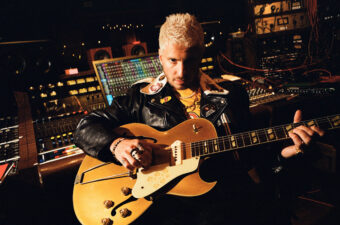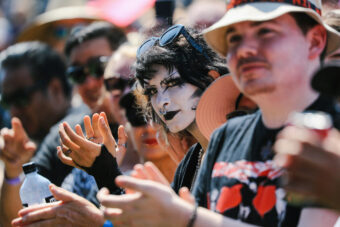Retro-minded psych-metal carnival Purson are a British five-piece who explore the world of witches and Wurlitzers on their debut album, The Circle and the Blue Door, out next week via Rise Above/Metal Blade. Led by 22-year-old vocalist Rosie Cunningham, they’re heavily indebted to the guitar-and-organ maelstroms of early prog; take melodic inspiration from the Beatles during their post-India freak-out phase; and of course toke tremendously on the fringe-jacket era of Deep Purple. Their songs reveal a predilection for fantasy — “Sailor’s Wife’s Lament,” “Mavericks and Mystics” that puts them in line with the Class of 2012 witch-metal bands like Royal Thunder and Christian Mistress — but Cunningham insists that her lyrics are rooted in the events of her own life. With its sense of operatic drama and its stellar musicianship, The Circle and the Blue Door is a singular, audacious entry into a current crop of retro-pop headbanger fare that should chill the marrow of fans of Ghost and Uncle Acid & the Deadbeats.
Stream their entire album below, and read our interview where we spoke with Cunningham and keyboardist Sam Shove about pyrotechnics, demonology, and David Bowie.
:audio=0:112495:playlist:Purson, The Circle and the Blue Door:
You cite bands like the Beatles and Led Zeppelin as major influences, but there’s also a distinct prog sound — certain songs call to mind Yes and ELP.
Sam Shove: We’re more concerned with the transition from heavy psych to prog. For a few years in the late ’60s and early ’70s, there were bands making expansive records not defined as “prog.”
Rosie Cunningham: Honestly, the Beatles are the reason why I write these songs.
This sounds like an album that would’ve been a big hit if it had come out in 1971 or ’72. Do you worry about its ability to find an audience today?
Cunningham: We have probably a better chance now than we have in the last 30 years. We’ve done it. We’re here at the right time.
Shove: With the Internet, people can tap into music worldwide. In the ’70s, people were restricted to what was available locally. Now people can get into what they’re really into.
There’s a lot of rich imagery in your lyrics. What do you look to for inspiration?
Shove: Real life. In the past year, Rosie and I experienced a lot of emotional turmoil.
Cunningham: I write about things going on; I don’t write about dragons and mountains. I write about what’s going on around us.
What’s an example?
Shove: In short, the people that Rosie and I were romantically involved with. It’s written about their eventual drug hell. It was inspiring.
What first got you into the guitar?
Cunningham: The James Bond theme song was the first thing I learned on guitar when I was six or seven.
Why did you decide to name the band after a figure in demonology?
Cunningham: We were drawn to a band called Amon Düül, who are named after an Egyptian god. We wanted to be named after a god too. But there was no god that suited our fancy, so we went with a demon. Purson is a cool guy. In demonology, he’s an angel cast out of heaven. It’s cool imagery. He looks cool. He plays a horn.
Shove: Demonology gets misconstrued. It’s not all devil worship. It represents a different view of life.
What was the inspiration for the cover art?
Shove: The front cover was inspired by the lyrical content, in particular “Mavericks and Mystics.” We’re the mavericks and mystics. We feel that we’re the right ones, and everybody on the outside are the crazy ones for not wanting to be involved in our world. It’s a big reference to reference to the David Bowie song “All the Madmen.”
What do you have in store for your live shows?
Shove: Lots of fire. Vaudeville carnival psych.
Cunningham: I was very into the idea of being a psych-pop band, but I’ve changed my mind and I’m actually into the idea of being very theatrical.
Shove: The way that the band presents itself is very important to us. We hope to create an image that is out-psyching the music. We’re hoping to create something as immersive as the music.





